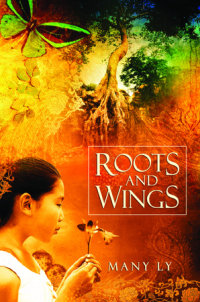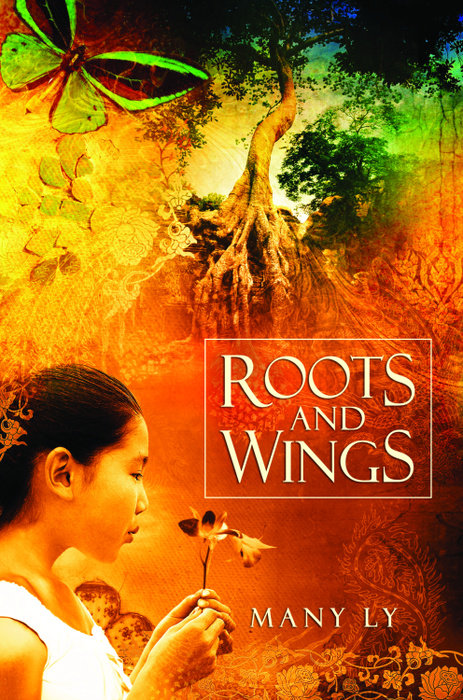I held Grandma’s ashes in a dark wooden urn on my lap. Mom and I were flying her to St. Petersburg, Florida so she could have a Cambodian funeral and not wander around hungry. I didn’t know why an American funeral couldn’t do the same thing, but I trusted that my mother knew what she was doing. Next to me and Grandma, Mom sat with her back to me and her face pressed against the window, lost in the endless light blue sky.
The airplane rocked, and I held Grandma tightly to my stomach. Earlier I had tried to place her down near my feet.
“Grace, don’t be disrespectful,” Mom had scolded. So I put Grandma back on my lap and held her like I might have held a baby.
My grandmother had been only fifty-one years old when she died, so she wasn’t an old lady. I had read in a magazine that being in your fifties or even sixties was like being in your forties a long time ago. Whoever wrote that article did not know…
I held Grandma’s ashes in a dark wooden urn on my lap. Mom and I were flying her to St. Petersburg, Florida so she could have a Cambodian funeral and not wander around hungry. I didn’t know why an American funeral couldn’t do the same thing, but I trusted that my mother knew what she was doing. Next to me and Grandma, Mom sat with her back to me and her face pressed against the window, lost in the endless light blue sky.
The airplane rocked, and I held Grandma tightly to my stomach. Earlier I had tried to place her down near my feet.
“Grace, don’t be disrespectful,” Mom had scolded. So I put Grandma back on my lap and held her like I might have held a baby.
My grandmother had been only fifty-one years old when she died, so she wasn’t an old lady. I had read in a magazine that being in your fifties or even sixties was like being in your forties a long time ago. Whoever wrote that article did not know my grandmother. She had been small and frail, and she was shorter than I was at fourteen years old. I could have easily put my arms around her waist and picked her up, giving her a shake or two until she started laughing. “Down, Grandchild, down,” she would say as she kicked. But oddly enough, in the urn, she was heavy.
On the plane many passengers looked down at Grandma and me as they walked past our row, but only eight people didn’t turn away when I looked back. A couple of them turned their eyes toward my grandmother, like they wanted me to tell them about her death. “You didn’t know her,” I would have said if they asked. One lady, in particular, frowned, and her eyes watered. She wanted to say she was “sorry” for my loss, I could tell. But I didn’t want to accept it. She didn’t know me, and I didn’t know her, so I didn’t think her apology would be sincere.
Mom finally turned away from the window. She had been crying again, her eyes red and swollen, her lips puffy. Considering what her relationship with Grandma had been like when she was alive, I was shocked by how many tears she had shed in the past two weeks. This was the same woman who was always blaming her mother for everything that happened in her life: What, now? Are you going to tell me how to spend my money, too? When will you ever understand me? Isn’t it enough for you that my life is this way!
My mother was one of those women who spoke perfectly, walked perfectly, and dressed perfectly. Her blouses were always ironed, and the colors she wore fit ideally–never clashing or too matchy matchy. She was what the cosmetic companies called a “natural beauty.” She also had a behind the older boys at school revered. So I’d never understood how “this way” could be all that bad.
Mom wiped her eyes dry and put on her large sunglasses. She sighed. “Up here, it’s like we’re in a different world. If not for this . . . this plane that holds us back . . . we could, you know, be free and fly.”
Like birds? I chose not to say anything, though, and soon the gap between her brows wrinkled up in disappointment. It was this kind of moment that reminded me I was not as smart as she was. Or as pretty. Or as perfect.
“You have it so easy. You’ll never know what it’s like to be caught between two worlds,” she said. She spoke to me like this often, all frustrated and out of gas.
“Was it like this, you know, when you came to America?”
Mom returned to the refuge of her window. “No, not at all.” I couldn’t hear her well, and I took the opportunity to move in closer to her, smelling her Calvin Klein Obsession. “I was so scared. I had puked so much on the plane that when it finally landed, I could hardly walk. Your grandma had to carry me off it.”
I didn’t doubt what my mother had said. She had never lied to me. If she didn’t want me to know the truth, she would just hide it from me. But I couldn’t picture Grandma carrying my mother. All of my life, it had been Mom who was strong.
As we approached Tampa International the captain got on the intercom and welcomed us to the Sunshine State. He flipped the seatbelt light off. The mother in front of me sang to her baby: we’re here, we’re finally here, and the kid behind me hollered that he was going to build the biggest sandcastle ever! As I held Grandma closer and reached down for my backpack, I was doing everything I could to not jump out of my seat and sing, too: I am here, I am finally here.

